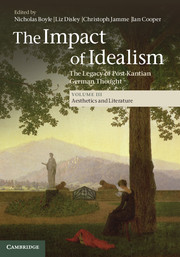Book contents
- Frontmatter
- Contents
- List of Illustrations
- List of Contributors
- Acknowledgements
- List of Abbreviations
- Introduction: Idealism in aesthetics and literature
- 1 The legacy of Idealism and the rise of academic aesthetics
- 2 Hegel's philosophical theory of action: the concept of action in Hegel's practical philosophy and aesthetics
- 3 Tragedy and the human image: German Idealism's legacy for theory and practice
- 4 Romanticism as literary Idealism, or: a 200-year-old way of talking about literature
- 5 Idealism in nineteenth-century German literature
- 6 Idealism in nineteenth-century British and American literature
- 7 Elements of Schopenhauer's thought in Beckett
- 8 German Idealism and the philosophy of music
- 9 The music of German Idealism
- 10 ‘Refiner of all human relations’: Karl Friedrich Schinkel as an Idealist theorist
- 11 Influences of German Idealism on nineteenth-century architectural theory: Schelling and Leo von Klenze
- 12 ‘Making a world’: the impact of Idealism on museum formation in mid-nineteenth-century Massachusetts
- 13 Hegel, Danto and the ‘end of art’
- Bibliography
- Index
- References
4 - Romanticism as literary Idealism, or: a 200-year-old way of talking about literature
Published online by Cambridge University Press: 05 December 2013
- Frontmatter
- Contents
- List of Illustrations
- List of Contributors
- Acknowledgements
- List of Abbreviations
- Introduction: Idealism in aesthetics and literature
- 1 The legacy of Idealism and the rise of academic aesthetics
- 2 Hegel's philosophical theory of action: the concept of action in Hegel's practical philosophy and aesthetics
- 3 Tragedy and the human image: German Idealism's legacy for theory and practice
- 4 Romanticism as literary Idealism, or: a 200-year-old way of talking about literature
- 5 Idealism in nineteenth-century German literature
- 6 Idealism in nineteenth-century British and American literature
- 7 Elements of Schopenhauer's thought in Beckett
- 8 German Idealism and the philosophy of music
- 9 The music of German Idealism
- 10 ‘Refiner of all human relations’: Karl Friedrich Schinkel as an Idealist theorist
- 11 Influences of German Idealism on nineteenth-century architectural theory: Schelling and Leo von Klenze
- 12 ‘Making a world’: the impact of Idealism on museum formation in mid-nineteenth-century Massachusetts
- 13 Hegel, Danto and the ‘end of art’
- Bibliography
- Index
- References
Summary
Those who sat in the main auditorium of the University of Göttingen on 8 and 9 November 2006 heard the following from the internationally renowned German author Daniel Kehlmann: ‘There is no professionalism in writing…Don't believe what any professor of poetry says.’ Even though Kehlmann uttered these words in the role of a poetry professor, the message cannot have surprised his audience. The view that authorship is not just something to be learned and executed in accordance with rules, is very well established. Indeed, Kehlmann would have surprised his audience much more if, without further ado, he had taken on the role of a poetry professor, and set out to explain and teach in a straightforwardly comprehensible way how to do literature. Questions about literature as Art point us to a realm way beyond the technical demands of its production; it has entirely disconnected itself from the perspective of such an aesthetic. On what, then, has it oriented itself instead? There were no surprises in the received wisdom to be heard from Kehlmann in the Göttingen auditorium. Formal perfection, he said, does not suffice for literature. Rather, there must ‘be an element of existential truth, a touching upon foundational facts of our existence. [Literature] must say something about us as human beings.’ Moreover, human beings are actually dependent on literature saying something to them as Art, for, as Kehlmann notes, a world in which art plays no role is ‘actually inhumane’. Where the author speaks about his own métier – Kehlmann's remarks were made under the title ‘lectures on poetics’ – he speaks in a wholly non-technical manner about the fundamental questions of humanity. Where he ought to be giving information as a representative of his craft, he denies any particular professionalism and slides off instead into general philosophy of art. The author who was supposed to be explaining his métier undergoes a metamorphosis into a philosopher who speaks of literature as a fundamental issue of humanity.
- Type
- Chapter
- Information
- The Impact of IdealismThe Legacy of Post-Kantian German Thought, pp. 69 - 91Publisher: Cambridge University PressPrint publication year: 2013



